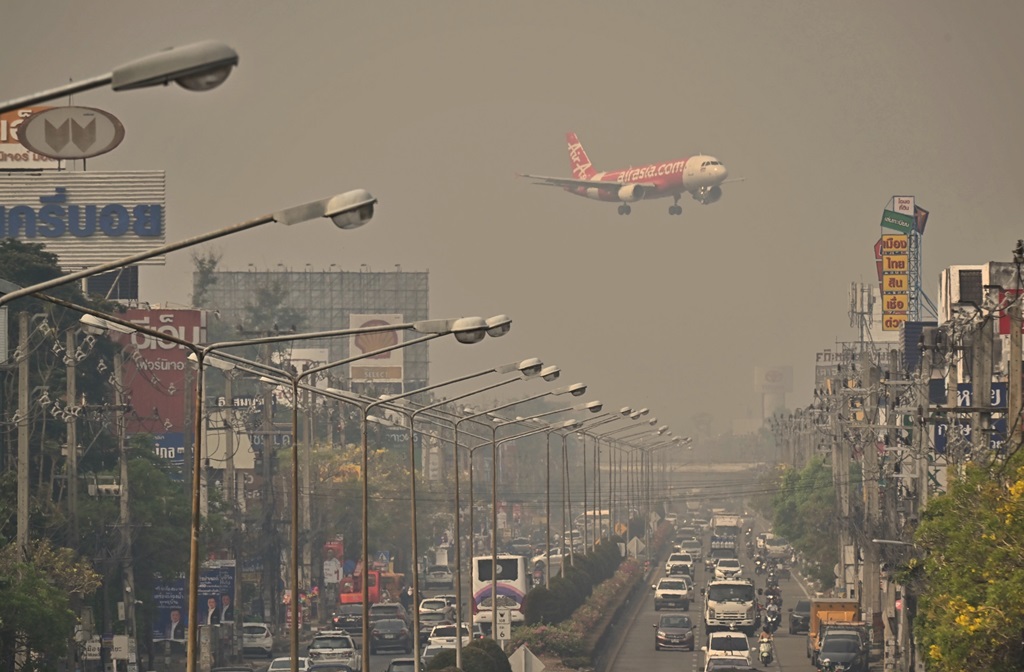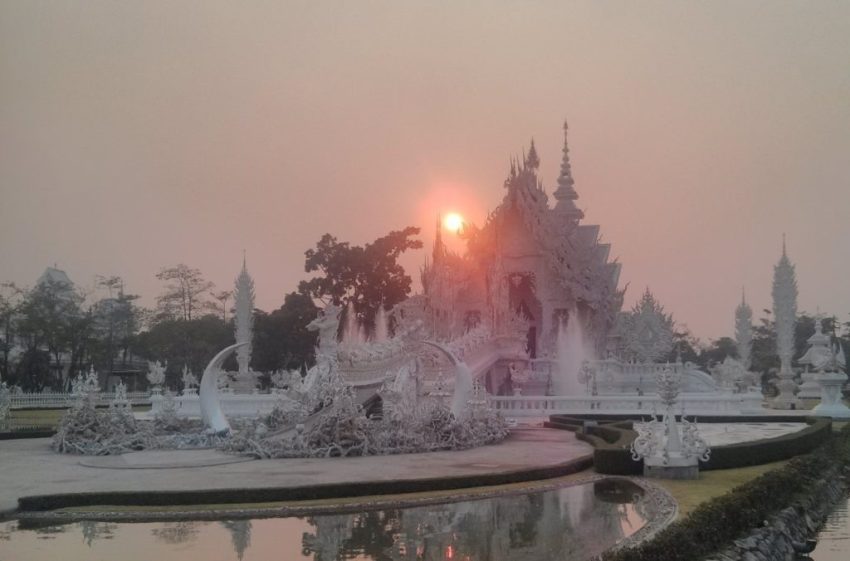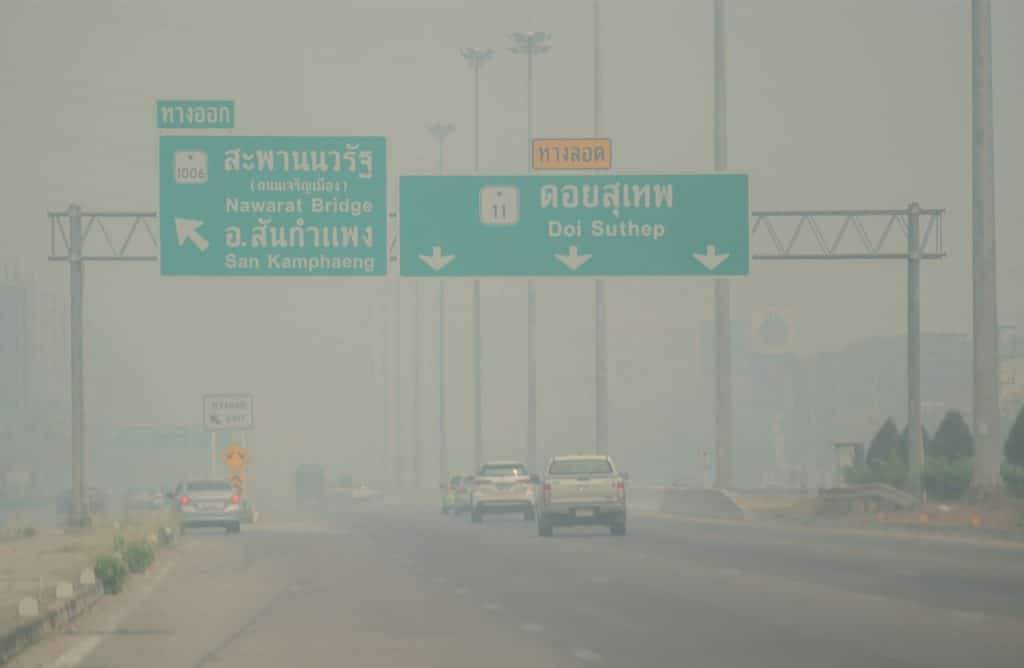Year after year, inhabitants of northern Thailand, particularly Chiang Mai, Chiang Rai, and Mae Hong Son, have braced themselves for suffocating PM2.5 air pollution. Thailand’s northern provinces have consistently been named the world’s worst PM2.5 air quality zones.
Chiang Mai had the world’s most dangerous PM2.5 hazardous dust particles number one spot in 2023 and 2024.
The effect has had a significant impact on the public healthcare system, while residents have purchased air purifiers and face masks to protect themselves. Those with resources can obtain private health insurance, but the majority of the province’s population cannot.
Opposition political parties, doctors, and civic groups are pressing the government to consider declaring the affected provinces as disaster zones.
Though the haze could have serious long-term consequences for tourism if tourists become aware of the problem and choose alternative sites with better air, the administration has stated that it does not want to declare these regions disaster zones.
With the fiscal budget allocation postponed until next month, opposition political parties requested the government on Saturday to declare Chiang Mai a disaster region, claiming that this status would allow the province to spend an additional budget to assist manage forest fires.
However, the government and some people objected to the announcement, claiming that it would cause insurance companies to deny claims for occurrences that occurred within the disaster region.
Prime Minister Srettha Thavisin stated that the government needed to defend the tourism industry. He stated that the decision to postpone the disaster designation was the product of careful consideration with authorities, since such a step could dissuade tourists from visiting Thailand.
Punlop Saejew, president of the Chiang Mai Tourism Council, said a disaster declaration would undoubtedly reduce visitor traffic, even if the sources of the haze have yet to be determined.
He stated that from March 1 to 16, Chiang Mai had direct flights with over 52,000 tourist arrivals, producing at least 1 billion baht for the province, particularly in tourism supply chains.
Mr Punlop warned that without tourists, tourism firms could run up debts, resulting in an avalanche of non-performing loans.
He previously stated that a framework such as the Clean Air Act is critical for dealing with PM2.5 haze.
According to Mr Punlop, the solution to the air pollution problem requires all parties to work together to enact suitable legislation, including harsh penalties for rulebreakers and rich rewards for those who follow the rules.
For example, he believes that farmers who avoid slash-and-burn farming should be rewarded by the government by providing agricultural subsidies.
Mr Punlop urged the government to set up a fund to decrease air pollution through a fundraising plan in exchange for investor incentives such as tax cuts. He suggested that the fund may be utilized to help improve local communities that burn fields by providing more ecologically friendly occupations.
Other methods include providing adequate tool and equipment to prevent burning and smog, such as assisting communities with air purifiers and firebreaks when burning.
Mr Punlop said that operators were concerned about the impact a filthy Chiang Mai might have on long-term visitors and digital nomads. These groups typically return to their home countries in March and April, when smog is at its highest, he said.
Meanwhile, commentators on the prime minister’s X account urged him to prioritize the health of Chiang Mai residents over concerns about the tourism industry.
According to Kamonsan Srivirach, chairman of the Thai Chamber of Commerce of Phayao, naming Chiang Mai a disaster zone due to high levels of PM2.5 dust must be carefully considered because it may harm the tourism industry.
However, a declaration would result in increased financing for disaster relief and healthcare. According to Thomas Wilson, president and CEO of Allianz Ayudhya Assurance, pollution is an issue in Thailand.
He claimed that pollution in the northern region is caused by forest fires and burning crop fields, but Bangkok is plagued by traffic congestion, manufacturing, construction, and the effects of northern provincial fires.
According to a recent article, the Public Health Ministry is concerned about the high levels of air pollution, and has lately alerted public hospitals across the country to prepare for an increase in respiratory disorders due to atmospheric conditions, according to Mr Wilson.
“Higher levels of pollution pose a health risk. According to the Respiratory Health Association, air pollution causes irritation, shortness of breath, coughing, wheezing, asthma attacks, and chest pain,” he told the Bangkok Post.
“Extended exposure to air pollution increases the risk of lung cancer, heart attacks, and stroke, with a greater potential impact on people with higher respiratory rates, such as children and the elderly, outdoor workers, and those with pre-existing heart and lung conditions.
“An air quality index of between 150-200 potentially affects everyone, especially more sensitive groups.”
Because of differences in insurance penetration rates between the North and Bangkok, the potential impact on the private insurance industry has been mitigated in comparison to the public health consequences.
In general, Bangkok has higher health insurance penetration rates due to higher levels of money and industry education.
As a result, the impact on respiratory disease claims is expected to be greater in Bangkok than in the North, but “lower than the impact on the general population in both areas,” said Mr Wilson.
He stated that there are numerous potential government and private sector answers to this issue, including stricter enforcement of forest burning prohibitions, increased incentives to work from home and commute less wherever possible, and lower electricity consumption.
“These public and private measures should be investigated and implemented before more drastic measures,” Mr. Wilson added.
Northern Thailand’s Chiang Mai Struggles to Combat Wildfires
Northern Thailand’s Chiang Mai Struggles to Combat Wildfires










